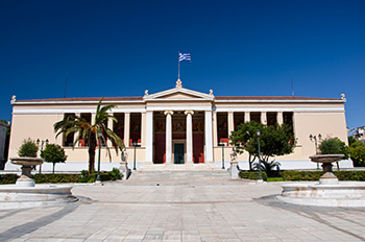- Funding Opportunities
- Political framework
- Cooperation priorities
- Highlights of bilateral cooperation
Funding opportunities
German-Greek Research and Innovation programme
Since 2013, the German-Greek Research and Innovation Programme has been implemented within the framework of the German-Greek Partnership Initiative, which was launched in 2010.
The main objectives of the programme are to strengthen cooperation between science and industry as well as knowledge and technology transfer and to involve small and medium-sized enterprises (SMEs) in particular. It also aims to integrate excellent young scientists from both countries into international projects at an early stage and in positions of greater responsibility. This is also intended to counteract the 'brain drain' in Greece. Key criteria for the projects to be funded are both their scientific added value and their connectivity to the European Research Framework Programmes.
The first edition of the programme ran from 2013 to 2015 and funded joint projects in the thematic areas of health research, bio-economy, energy, humanities and social sciences (with a focus on the financial and economic crisis), research for the digitalisation of personal services and for ICT application services, nanotechnology and photonics.
The 2nd German-Greek Research and Innovation Programme ran between 2018 and 2022. Thematically, the selected projects were distributed across the scientific fields of health, bio-economy, energy, culture-tourism-culture (humanities and social sciences), materials research and key technologies.
The Federal Ministry of Research and Education and the Greek General Secretariat for Research and Innovation (GSRI) jointly prepared a brochure with an overview of all the projects of the 2nd German-Greek Research and Innovation Programme.
The third edition of the German-Greek Research and Innovation Programme is currently being planned.
Political framework
In 1978, Germany and Greece established a legal framework for scientific and technological cooperation, which has since been supplemented by individual agreements. The most recent additions are the German-Greek Partnership Initiative of 5 March 2010 and the agreements (Joint Declaration of Intent on Cooperation in the Field of Vocational Education and Training) of 10 December 2012, 16 February 2016, and 16 June 2021 (running for 4 years). They are a direct response of the two partners to the difficult economic situation in Europe since 2009.
Cooperation priorities
The focus of the cooperation with Greece is based on the German-Greek Research and Innovation Programme and its defined scientific themes:
- Health research,
- Bio-economy,
- Energy,
- Humanities and social sciences,
- Materials,
- Key technologies.
Particular importance is attached to the fact that the joint projects should generate knowledge and exploitable research results leading to new technologies, products and/or services. In the long term, this should lead to an improvement in the competitiveness and innovation potential of the partners in Greece.
Highlights of bilateral cooperation
The German Federal Ministry of Education and Research (BMBF) is successfully collaborating with Greece in joint research cooperations in research and vocational training as part of the German-Greek partnership initiative of the Federal Government (DGP) dated 5 March 2010.
Joint German-Greek research programme
The first German-Greek research and innovation programme was launched on 21 March 2013 with the aim of providing cross-thematic bilateral research funding. The overwhelming number of more than 400 project outlines submitted on both sides confirmed this approach. It also demonstrated the continued high level of interest in scientific and research cooperation in both countries. In a joint selection meeting, 23 research projects were selected.
During the Greek-German Research and Innovation Days in Athens in December 2015 with more than 150 participants, both a review of the first "German-Greek Research Programme" and the perspectives of the successor programme were discussed.
Between 2018 and 2022, both countries funded 24 '2+2' projects. They invested more than 8 million euros each as part of the 2nd German-Greek Research and Innovation Programme. As a rule, the funding for the 3 year collaborative projects (extensions were granted due to COVID-19 pandemic) amounted to a maximum of 350,000 euros per project and per country. On the Greek side, the funding came from the EU Structural Funds.
Further milestones of the 2nd German-Greek Research and Innovation Programme were:
- A technology transfer workshop conducted with all project participants in Athens (Greece) in summer 2019.
- An online evaluation at the end of 2020 focusing on knowledge and technology transfer.
- A second (virtual) technology transfer workshop on 30 June 2021 to replace the status conference (mid-term meeting) scheduled for 1 and 2 April 2020 in Berlin, which had to be cancelled due to the COVID-19 pandemic.
The Federal Ministry of Research and Education and the Greek General Secretariat for Research and Innovation (GSRI) jointly prepared a brochure with an overview of all the projects of the 2nd German-Greek Research and Innovation Programme.
Vocational training
With the establishment of the German-Greek Working Group on Vocational Education and Training, a regular dialogue has been established between the BMBF and the Greek Ministry of Education, social partners and chambers in both countries as well as the German Embassy, the German School Abroad, the German-Greek Assembly and others. The cooperation is based on the Memorandum on Cooperation in Vocational Education and Training that Germany signed with six European countries in December 2012.
The bilateral agreement on cooperation in dual vocational education and training between the BMBF and the Ministry of Education, Research and Religious Affairs was extended for a third time on 16 June 2021 for four more years. The thematic priorities of the cooperation are 'Development and testing of dual training models', 'Support of the social partner dialogue in vocational education and training' and 'Green occupations' and vocational orientation.
With the publication of the funding announcement 'Internationalisation of Vocational Education and Training', German education providers have the opportunity to support Greek reform efforts through joint projects. Three projects with Greece have been completed, one project is currently ongoing.








